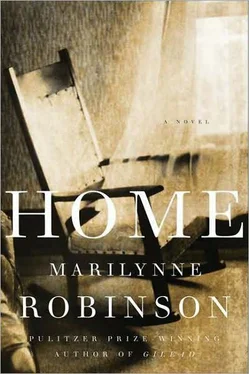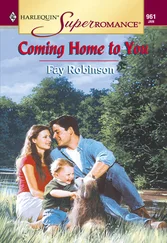When she walked in from the garden, the house had already begun to smell like Sunday. It brought tears to her eyes. That old orderliness, aloof from all disruption. Sabbath and Sabbath and Sabbath. The children restless in their church clothes, the dresses and jackets and shoes that child after child stepped into, out of, put on, took off, as his or her turn came. Too large and then too small, but never ever comfortable. Eight of them, or seven, crowded at that table, three on the piano bench, one on the kitchen stool, practicing their manners — keeping their elbows to themselves, not swinging their legs, for an hour not going on with the teasing and arguing that were endless among them. Waiting for the blessing, waiting for the guests to be served — always ancient men with some ecclesiastical dignity attached to them which entailed special prohibitions against childish behavior. Waiting to speak until they were spoken to, until the meal was finished, out of respect to talk of creeds and synods. Waiting even to begin until their mother lifted her fork, which she would not do until every major sign of impatience among them was suppressed. And Jack so quiet, if he was there at all.
The dining room was immutable, like the rest of the house. But it was oppressive in ways that could easily have been changed. If she could have taken down the plum-colored drapes that hung over the lace curtains that covered the window shades, she’d have done it in a minute. If she could have taken up the plum-colored carpet with lavender fins or fans or fronds in a border around it. She’d have cleared the sideboard of the clutter of knickknacks, gifts displayed as a courtesy to their givers, most of whom by now would have gone to their reward. Porcelain cats and dogs and birds, milk-glass compote dishes. But in this place of solemn and perpetual evening, every family joy had been given its occasion, and here they would celebrate Jack’s homecoming, if he woke up in time. When her father had been up and dressed for half an hour, he said, “You might just go knock at his door,” and then they heard him on the stairs.
He stepped through the doorway and paused there. He was wearing his jacket and tie. He looked tentative, as if he were afraid he might presume, and as if he would be happier somewhere else. He looked like the old Jack. Her father must have thought so, too, because he was clearly moved to see him. A moment passed before he said, “Come in, son. Sit down, sit down.”
Glory said, “You can light the candles, Jack.” She went into the kitchen for the roast and came back to find the two of them silent in the candlelight, her father lost in thought, Jack toying with a matchbook. Twenty years before, they had had a quiet conversation in that room. She should have thought of that. She should have served dinner in the kitchen.
When the biscuits were on the table and she had taken her place, the old man rose from his chair to address the Lord. “Dearest Father,” he said, “Father whose love, and whose strength, are unchanging, in whose eyes we too are unchanging, still your beloved children, however our fleshly garment may soil and wear—”
Jack smiled to himself, and touched the scar beneath his eye.
“Holy Father,” the old man said. “I have rehearsed this prayer in my mind a thousand times, this prayer of gratitude and rejoicing, as I waited for an evening like this one. Because I always knew the time would come. And now I find that words fail me. They do. Because while I was waiting I got old. I don’t remember those prayers now, but I remember the joy they gave me at the time, which was the confidence that someday I would say one or another of them here at this table. If I lived. I thought my good wife might be here, too. We do miss her. Well, I thank you for that joy, which helped through hard times. It helped very much.” He paused.
“But when I think what it is that brings us to our Father, it might be grief or sickness — trouble of some sort. Weariness. And then there we are, and it’s a good thing at such times to know we have a Father, whose joy it is to welcome us home. It really is. Still, humanly speaking, there is that trouble, that sorrow, and a Father has to be aware of it. He can’t help it. So there is a sadness even in great blessing, which can be a hard thing to understand.” He seemed to ponder.
“Lord, put the veil of time and sorrow aside for us. Restore us to those we love. And restore the ones we love to us. We do long for them—”
Jack said softly, “Amen.” His father looked up at him, so he shrugged and smiled and said, as if by way of explanation, “Amen.”
“Yes, well, I was finished, really. I’m sorry I went on.”
“No, sir. I’m sorry — I didn’t—” He put his hand to his face and laughed.
His father said, “No need to apologize, Jack! Here you’ve only been home a few hours and I have you apologizing to me! No! We can’t have that, can we now!” He put his hand very gently on Jack’s shoulder. “And here I am letting our dinner get cold! Do you want to carve, Jack?”
“Maybe Glory wouldn’t mind?”
“Not at all,” she said, and she cut the roast, and gave the first piece to her father, the second to herself, and the third to Jack. “There’s still a little pink to that one,” she said.
And he said, “It looks wonderful. Thank you.”
Her father strove manfully to generate conversation at a level of undamaging abstraction. “I believe the threat of atomic war is very real!” he said. “This is a point on which Ames and I do not agree! He has never made a proper estimate of the force of sheer folly in the affairs of nations! He pretends to be mulling it over, but I know he will vote Republican again. Because his grandfather was a Republican! That’s what it comes down to for people around here. Whose grandfather was not a Republican? But there is no way to reason with him about it. Not that I’ve stopped trying.”
“I’m a Stevenson man, myself,” Jack said.
“Yes. That’s excellent.”
She ought to have closed her eyes during that prayer, or lowered them, at least. But there was Jack, just across the table from her, studying his hands, then glancing up at the oddnesses of the room, the overbearing drapes and the frippery glass droplets on the light fixture, as if the sound of the old man’s words were awakening him to the place. When he met her eyes he smiled and looked away, uneasy. Why did it seem like an elegance in him, that evasiveness? How would he look to her, seem to her, if he had not been, for so many years, the weight on the family’s heart, the unnamed absence, like the hero in a melancholy tale? It seemed to her as if he ought to have been beautiful, and he was not. He had the lank face that was to be looked for in a Boughton, and weary eyes, and the coarsened skin of middle age. He put his hand to his brow as if to shield himself from her attention, then he dropped it to his lap, perhaps because it trembled. She was glad when he said “Amen,” grateful. When her father spoke to the Lord he spoke in earnest — out of the depths, as he said sometimes. Out of a grief so generous it embraced them all.
When dinner was over, Jack helped her clear away the dishes, and he washed them, too, while she was helping her father to bed. She came into the kitchen and found him almost done, the kitchen almost in order. “Amazing,” she said. “This would have taken me an hour.”
He said, “I have had considerable professional experience, madam. I share the Boughton preference for the soft-handed vocations.” She laughed, and he laughed, and their father called out to them, “God bless you, children! Yes!”
GLORY HAD OFTEN REFLECTED ON THE FACT THAT Boughtons looked very much like one another. Hope was the acknowledged beauty of the family, which is to say the Boughton nose and the Boughton brow were less pronounced in her case. All the rest of them, male and female, were, their mother said, handsome. They all passed from cherubic infancy to unremarkable childhood to gangling youth to that adult state of Boughton-hood their mother soothed or praised with talk of character and distinction, Hope being the one exception. So adolescence was a matter of watching unremarkable features drift off axis very slightly, of watching the nose knuckle just a little and the jaw go just a bit out of square. So Glory’s face had transformed itself in its inevitable turn. She remembered her alarm.
Читать дальше












